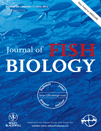
JOURNAL OF FISH BIOLOGY
Scope & Guideline
Pioneering Research in Fish Biology and Ecology
Introduction
Aims and Scopes
- Ecological Dynamics:
Research on fish populations, their habitats, and interactions within ecosystems, including studies on migration patterns, habitat use, and community dynamics. - Physiological and Biochemical Studies:
Investigations into the physiological processes of fish, including metabolic rates, stress responses, and adaptations to environmental changes. - Genetic and Evolutionary Research:
Exploration of genetic diversity, population structure, and evolutionary relationships among fish species, often utilizing molecular techniques. - Taxonomy and Systematics:
Descriptions of new species, taxonomic revisions, and assessments of biodiversity, contributing to the classification and understanding of fish diversity. - Conservation and Management:
Studies addressing the implications of human activities on fish populations, including fisheries management, habitat restoration, and the effects of climate change. - Behavioral Ecology:
Research focusing on the behavior of fish in various contexts, including mating strategies, foraging behavior, and responses to environmental stimuli. - Aquaculture and Fisheries Science:
Investigations into the practices of fish farming and sustainable fisheries management, including studies on growth performance, health, and welfare.
Trending and Emerging
- Climate Change Impacts:
Increased research focusing on how climate change affects fish physiology, behavior, and population dynamics, reflecting a growing concern for environmental sustainability. - Environmental DNA (eDNA) Applications:
Emerging studies utilizing eDNA for biodiversity assessments, species detection, and monitoring fish populations, showcasing innovative methodologies in ecological research. - Genomic and Transcriptomic Analyses:
A notable rise in research employing genomic tools to explore genetic diversity, evolutionary relationships, and responses to environmental stressors in fish. - Fish Welfare in Aquaculture:
Growing emphasis on the welfare and health of fish in aquaculture settings, reflecting broader societal concerns regarding ethical practices in food production. - Behavioral Ecology and Cognition:
Increased interest in understanding fish behavior, cognition, and social interactions, indicating a shift towards recognizing the complexity of fish as sentient beings. - Conservation Genetics:
Emerging studies focusing on the application of genetic tools to inform conservation strategies, particularly for endangered and threatened fish species.
Declining or Waning
- Traditional Fishery Methods:
There is a noticeable decline in studies focusing solely on traditional fishery practices, as the field moves towards more sustainable and innovative approaches. - Morphological Studies:
Research primarily centered on morphological characteristics without integrating genetic or ecological perspectives seems to be less frequent, indicating a shift towards more holistic approaches. - Invasive Species Research:
While still relevant, the volume of studies specifically dedicated to invasive species has decreased, possibly due to a broader focus on ecosystem dynamics and conservation. - Historical Ecology:
Research that strictly examines historical aspects of fish populations without linking to current ecological or conservation issues appears to be waning. - Taxonomic Descriptions of Common Species:
The emphasis on describing well-known or common species may be declining as the focus shifts towards more unique or endangered species that require urgent attention.
Similar Journals
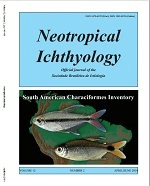
Neotropical Ichthyology
Advancing ichthyological knowledge in the heart of the Neotropics.Neotropical Ichthyology is a prestigious open-access journal published by the SOC BRASILEIRA ICTIOLOGIA, dedicated to advancing the field of ichthyology within the Neotropical region. Since its inception in 2003, the journal has provided a vital platform for researchers, professionals, and students to disseminate significant findings related to fish biology, ecology, and conservation. With an impact factor that is reflected in its impressive Q1 ranking in Animal Science and Zoology and Q2 rankings in both Aquatic Science and Ecology, Evolution, Behavior and Systematics, it stands as a leading resource for cutting-edge research. Located in Brazil, at the UNIV SAO PAULO, the journal not only contributes to scientific knowledge but also fosters collaboration among ichthyologists dedicated to the rich aquatic biodiversity of the Neotropical region, ensuring that critical insights into fish species, habitats, and conservation strategies are accessible to a global audience.

ENVIRONMENTAL BIOLOGY OF FISHES
Advancing knowledge in aquatic ecosystems.ENVIRONMENTAL BIOLOGY OF FISHES, published by SPRINGER, is a premier journal in the fields of Aquatic Science and Ecology, Evolution, Behavior and Systematics. With a rich history spanning from 1976 to 2024, this esteemed journal provides a platform for groundbreaking research that addresses critical issues such as fish ecology, species behavior, and environmental influences on aquatic life. Recognized for its significant contributions, it holds a Q2 ranking in both the Aquatic Science and Ecology categories, reflecting its influence and relevancy in the academic community. The journal's focus on innovative ecological studies makes it an essential resource for researchers, professionals, and students dedicated to advancing our understanding of fish biology and the broader ecological systems of which they are a part. Although not an open-access publication, the insights and findings presented in its articles are invaluable for those engaged in the preservation and sustainable management of aquatic environments.

REVIEWS IN FISH BIOLOGY AND FISHERIES
Fostering innovation in aquatic research since 1991.Reviews in Fish Biology and Fisheries, published by Springer, is a prestigious journal dedicated to advancing our understanding of fish biology and the principles underpinning fisheries science. With an impact factor reflective of its high citation rate and its recognition as a Q1 category journal in Aquatic Science, it ranks impressively at #9 out of 247 in the Scopus database, placing it within the top 4% of its field. Established in 1991, this journal serves as a crucial platform for researchers, professionals, and students alike, offering comprehensive reviews and insights that foster innovation and collaboration in aquatic research. Although it is not available as an open-access publication, its rigorous peer-review process ensures the dissemination of quality research that informs policy and practices in fisheries management globally. With a diverse range of topics covered, the journal is an essential resource for anyone aiming to deepen their knowledge and impact in the dynamic fields of fish biology and fisheries.
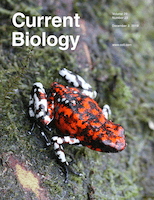
CURRENT BIOLOGY
Illuminating Pathways in Agricultural and Biological ResearchCURRENT BIOLOGY is a premier academic journal published by CELL PRESS, dedicated to a broad spectrum of fields within biological sciences. With an ISSN of 0960-9822 and E-ISSN 1879-0445, the journal has established itself as a vital resource for groundbreaking research and advancements since its inception in 1991. CURRENT BIOLOGY boasts high prominence in its categories, securing a Q1 quartile ranking in Agricultural and Biological Sciences, Biochemistry, Genetics and Molecular Biology, and Neuroscience, indicating its significant impact and relevance in these fields. Notably, it ranks #9 out of 221 journals in Agricultural and Biological Sciences, placing it in the 96th percentile, while also maintaining a strong presence in the Biochemistry category with a rank of #26. Researchers and professionals can rely on CURRENT BIOLOGY for comprehensive reviews, innovative methodologies, and crucial scientific developments that bridge theoretical knowledge with practical applications. The journal continues to play an essential role in enhancing the global dialogue in biological research, making it indispensable for students, academics, and industry experts aiming to stay at the forefront of the rapidly evolving landscape of life sciences.

Latin American Journal of Aquatic Research
Unveiling the Wonders of Oceanography and Aquatic ScienceLatin American Journal of Aquatic Research (ISSN: 0718-560X) is a distinguished scholarly publication that has been paving the way for aquatic science research since its transition to Open Access in 2008, allowing unhindered access to diverse scientific inquiries conducted in Latin America and beyond. Published by Pontificia Universidad Catolica de Valparaiso in Chile, this journal serves as a vital platform for researchers and practitioners in the fields of Aquatic Science and Oceanography. With an esteemed Q3 ranking in both categories as of 2023, it is dedicated to disseminating high-quality research findings that address pressing ecological and biological challenges. The journal’s reach and impact are reflected in its Scopus rankings, where it stands at the 36th percentile in Oceanography and the 35th percentile in Aquatic Science. Researchers, professionals, and students alike will find valuable insights and data-driven articles that further the understanding of aquatic ecosystems, making it an essential resource for ongoing studies and future innovations.

BOLETIM DO INSTITUTO DE PESCA
Illuminating emerging studies in aquatic sciences.BOLETIM DO INSTITUTO DE PESCA, published by the Instituto Pesca, is a Brazilian journal dedicated to advancing the fields of Animal Science and Aquatic Science. With its Open Access policy adopted in 2008, the journal ensures that research is widely disseminated, fostering collaboration and innovation among researchers, professionals, and students alike. Despite its recent Q4 category rankings in the 2023 metrics for both disciplines, the journal plays a vital role in providing a platform for emerging studies and critical discussions related to aquatic ecosystems and fisheries management. Covering a wide range of topics within its scope, BOLETIM DO INSTITUTO DE PESCA publishes original research, reviews, and case studies, stimulating academic dialogue and contributing to the sustainable management of aquatic resources in Brazil and beyond. This journal is an essential resource for anyone invested in marine and freshwater biology, ecology, and conservation.
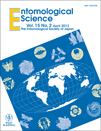
ENTOMOLOGICAL SCIENCE
Unraveling the Secrets of Insect LifeENTOMOLOGICAL SCIENCE, published by WILEY, stands at the forefront of research in the field of entomology, focusing on the intricate relationships between insects and their environments. With its ISSN 1343-8786 and E-ISSN 1479-8298, this esteemed journal, based in the United States, has been serving the scientific community since 2005. As a Q3 journal in both Ecology, Evolution, Behavior and Systematics and Insect Science, it presents vital peer-reviewed articles that advance our understanding of insects and their ecosystems. With a Scopus rank of 85/181 in Insect Science, the journal not only reinforces the importance of insect study but also serves as an essential resource for researchers and professionals seeking to explore and disseminate knowledge in this dynamic field. Although it does not offer Open Access options, its scholarly contributions are invaluable for those invested in ecological research and entomological perspectives—making it a must-read for aspiring and established scientists alike.
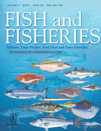
FISH AND FISHERIES
Advancing aquatic science for a sustainable future.FISH AND FISHERIES is a premier academic journal published by Wiley, dedicated to advancing knowledge in the fields of aquatic science, ecology, and oceanography. With an impressive impact reflected in its 2023 categorization in the Q1 quartile across multiple disciplines—including Aquatic Science and Management, Monitoring, Policy and Law—it serves as an essential resource for researchers, professionals, and students alike. This journal includes rigorous, peer-reviewed articles that address the multifaceted aspects of fish biology, conservation, and sustainable fisheries management. The journal's Scopus rankings further validate its significance, with top positions in Earth and Planetary Sciences, and its commitment to fostering scientific dialogue in an era where the oceans and aquatic ecosystems face unprecedented challenges. Despite not being an Open Access journal, FISH AND FISHERIES remains a vital platform for innovative research that informs policy and drives stewardship of fish populations and their habitats.

ZOOLOGICHESKY ZHURNAL
Unveiling the mysteries of behavior and systematics in the animal kingdom.Zoologichesky Zhurnal, a prominent journal in the field of Ecology, Evolution, Behavior and Systematics, has been a vital publication since its inception in 1950. Published by MAIK Nauka-Interperiodica in the Russian Federation, this journal has established a notable reputation in disseminating scientific research and advancing knowledge in zoology. With its coverage spanning from 1950 to 2023, and a specific convergent focus during 1982-1983, this journal contributes significantly to the ecological and evolutionary sciences, even though it currently holds a Q4 classification in the 2023 category quartiles, indicating its niche positioning among peers. Researchers and students engaged in the study of biological sciences, particularly those interested in the dynamics of ecosystems, behavior of species, and evolutionary processes, will find valuable insights and original research articles within its pages. While access to this esteemed journal is not open, it remains an essential resource for those seeking to deepen their understanding of zoological sciences.
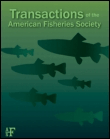
TRANSACTIONS OF THE AMERICAN FISHERIES SOCIETY
Championing conservation through rigorous peer-reviewed research.TRANSACTIONS OF THE AMERICAN FISHERIES SOCIETY, published by Wiley, is a leading journal dedicated to the field of fisheries science and aquatic ecology, with a rich history dating back to its inception in 1872. As an esteemed publication within the realms of Aquatic Science and Ecology, Evolution, Behavior, and Systematics, it currently holds a Q2 quartile ranking, demonstrating its significance and influence in these disciplines. The journal is not open access, which enables a curated peer-review process while ensuring high-quality research dissemination. The journal serves as a vital platform for scholars and practitioners alike, providing essential insights into the management and conservation of aquatic resources. Its commitment to addressing contemporary challenges faced in fisheries and aquatic environments makes it indispensable for researchers, professionals, and students seeking to contribute to this dynamic field.